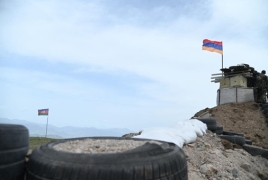
Armenia has surrendered essential positions to Azerbaijan without securing anything in return, political analyst Tatevik Hayrapetyan stated, criticizing Prime Minister Nikol Pashinyan's approach to peace talks since 2021.
Azerbaijan is introducing new demands, indicating it seeks to prolong the negotiation process, Hayrapetyan wrote on Telegram. She stressed that throughout these talks, Armenia has conceded its most critical strategic positions to Baku without gaining anything substantial in exchange.
She attributes the situation to Pashinyan’s political strategy, which, since 2021, has followed a process shaped by Azerbaijan. “When Pashinyan entered this Azerbaijani-driven process, he failed to grasp—or perhaps had other motives—that he would have to surrender key positions,” she wrote. According to Hayrapetyan, the agreement under discussion at the time even involved clauses referencing the rights and security of the people of Nagorno-Karabakh.
As a result of this policy, she noted, Azerbaijan has started referring to “Western Azerbaijan” at the state level. “Even if Pashinyan refuses to see the consequences, that doesn’t change the harsh reality,” she added. Quoting a popular saying, she wrote: “If you don’t look at me, it doesn’t mean I don’t see you.”
If Pashinyan continues convincing himself that this is the right path, Hayrapetyan warned, Armenia will pay a steep price, as the country has already ceded its most vital cards to Azerbaijan and received only further threats of aggression in return. “That is a fact,” she emphasized.
On March 13, Armenia’s Ministry of Foreign Affairs announced that it accepted Azerbaijan’s proposals on two previously unresolved points of the peace agreement, stating that the agreement is now ready to be signed. Armenia expressed readiness to begin consultations on the time and place for the signing. Meanwhile, Baku introduced new preconditions and stated it is still too early to discuss dates.
The draft peace agreement contains 17 points, 15 of which had been agreed upon earlier. The unresolved issues involved the mutual renunciation of international claims and the deployment of third-country representatives on the Armenia-Azerbaijan border.

